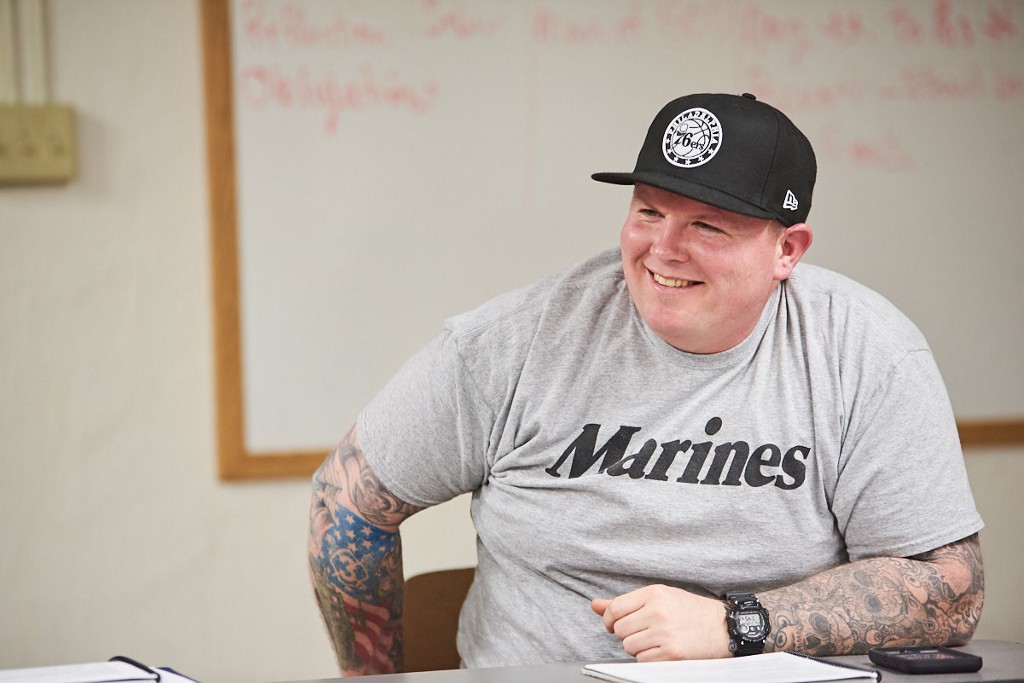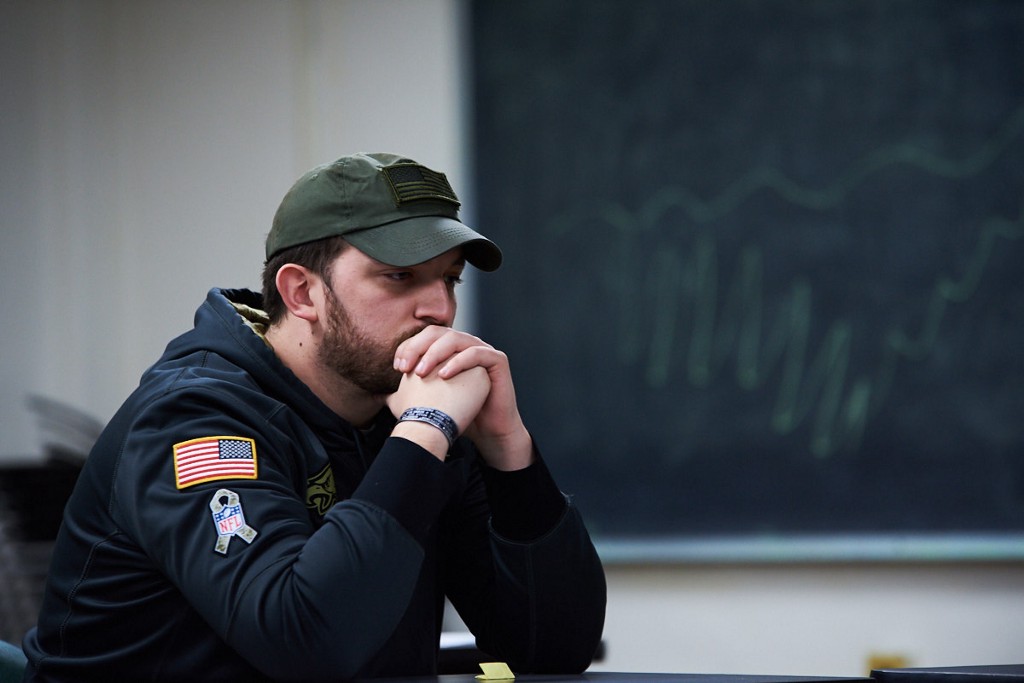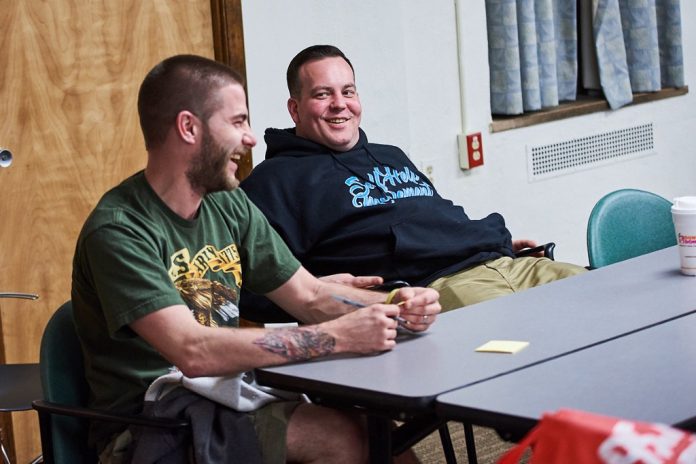Eight vets gathered in a conference room at Aria-Jefferson Health on Feb. 20. The group consisted of Drew, an Army veteran, and Rob, a Marine Corps veteran. MARIA YOUNG / TIMES PHOTO
The global psychiatric community first defined post-traumatic stress disorder in the late 1970s, but the practical condition has a much longer history within the context of military combat.
In the fifth century B.C., Greek dramatist Sophocles wrote the tragedy of Ajax, a mythological hero who slayed 28 enemies during the decade-long Trojan War only to return home despondent. In a bout of rage, he slaughtered a flock of sheep. When he came to his senses and realized what he had done, he committed suicide rather than live in shame.
“He had a lot of loss and never really dealt with what was troubling him. He ended up hurting other people and taking his own life,” said Tim Wynn, a former Marine and Iraq War veteran from Mayfair.
That’s why Ajax was the ideal symbol for a newly formed veterans support group that meets weekly at Aria-Jefferson Health’s Torresdale campus. Wynn is one of the facilitators of Healing Ajax, a program of the East Germantown-based nonprofit Resources for Human Development.
Eight vets, mostly combat vets from Iraq or Afghanistan, gathered in a conference room at the hospital on Feb. 20. They met for about 90 minutes, but they didn’t share old war stories. They didn’t talk about what they had done overseas or what wrongs they may have committed upon their return. Rather, they spoke of recovery from drug and alcohol abuse, of coping with their frustrations non-violently, of reconciling with loved ones and their faith in a higher power.
And they spoke of helping one another to accomplish those goals.
“Now we’re like a small team,” Wynn said. “The camaraderie comes back into our lives that’s been missing and we’re working on positive goals. We’re used to being on a mission in the military and now our mission is recovery.”
Long before his involvement with Healing Ajax, Wynn had his own troubles to rectify and overcome. He and a hometown pal named Rob joined the Marines together, served together, came home together and struggled together to reintegrate into civilian life.
“I can only speak for myself and I had my problems with drugs, alcohol and prison,” Wynn said. “Four days after coming home, I got arrested for aggravated assault and was sitting in a jail cell. I went from hero to zero real quick.”
His troubles also landed him in a Philadelphia courtroom. Fortunately for Wynn, the room happened to be Judge Patrick Dugan’s Veterans Court. Created in 2010, the specialty court is meant to point eligible vets toward the multitude of social services available to them while engaging them with mentors and close court supervision.
The Veterans Administration, District Attorney’s Office, Defender Association and various veterans agencies are partners in the program, which may direct vets to drug and alcohol rehab, medical assistance, psychological counseling, homelessness services, career counseling and other services. If the vet completes his court obligations, his criminal record may be expunged.
ldquo;We bring in a team of social workers, case managers, mentors, peer mentors, attorneys, therapists, and we treat the defendant as a whole person — not just look at the criminal act,” Dugan said in a 2014 interview with newsworks.org
Healing Ajax is one of those peer-based components. RHD created the program in 2008 in the Veterans Multi-Service Center at Fourth and Race streets. Some homeless vets comprised the initial peer group.
By the time Wynn landed in Veterans Court, Healing Ajax was meeting at 3300 Henry Ave. in East Falls.
“I started as a defendant and graduated and became a mentor,” said Wynn. “I’ve made a lot of relationships through the court. It’s like we have a common bond.”
Eventually, he began facilitating a Healing Ajax group in the city’s prisons. Then early last year, he realized that there were a lot of vets in the Northeast who could probably benefit from a support group in their own community. Wynn learned of the conference space at Aria-Jefferson through a 12-step program that meets there. He managed to book the room every Monday night at 6:30 for six months.
The first meeting was held early last May.
“There were four of us that first night,” Wynn said.
On Feb. 20, the group consisted of Wynn and his old friend Rob, who works for the Self-Help Movement on Southampton Road. A third Marine Iraq War vet, Max, joined them, as did Drew and Joe, who both are Army Iraq vets; Kevin, a Marine who served in Afghanistan; Pat, a Coast Guard vet who served in Iraq and the Caribbean; and David, an Army vet who served in Vietnam.
Jim McPhail is the group’s co-facilitator. The Kensington native is not a military veteran, but he’s a recovering drug and alcohol abuser with 37 years sober and a master’s degree in human services.
“(Healing Ajax) was envisioned as a peer program, but the courts want a clinical component,” McPhail said.
Typically, the sessions begin with casual conversation before the facilitators launch a structured, introspective dialogue focusing on the participants’ recent accomplishments and personal aspirations.
On Feb. 20, Rob talked about an engagement party that he hosted for his parents and his fiancee’s parents, who seemed to get along well. Joe said he started a new softball season and helped a buddy move into a new home. Kevin spoke of his trip to Baltimore where he reunited with a Marine he knew in Afghanistan. Pat said he’s getting a new online business started. David finally got a new walker and has regained mobility after a major fall.
Soon, the conversation turned to things like the men’s innermost motivations. When McPhail asked them what matters most in their lives, the men fired off responses like family, friends, faith, recovery and creating a personal legacy.
Sobriety is most important to Wynn because it affects everything else in his life.
“I know when I use alcohol or drugs, I destroy things. I burn every bridge I’ve built,” he said.
Joe agreed: “My dad said to me, ‘You’ve done more damage with a bottle of vodka than an M-4.’ And he makes sense.”
Max mainly hopes that people will view him as a “solid dude,” like his dad.
“I don’t need to be some big hero as long as the people who depend on me can depend on me,” he said. ••

Band of brothers: Eight vets gathered in a conference room at Aria-Jefferson Health on Feb. 20. Tim Wynn (pictured), a former Marine and Iraq War veteran from Mayfair, is also the group’s facilitator. MARIA YOUNG / TIMES PHOTO

The power of healing: Kevin, a Marine Corps veteran who served in Afghanistan, was one of eight veterans who joined a veterans support group, Healing Ajax. The group meets weekly at Aria-Jefferson Health’s Torresdale campus. MARIA YOUNG / TIMES PHOTO





